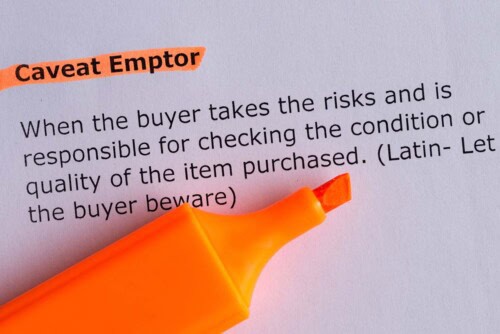Caveat emptor is a Latin phrase meaning “let the buyer beware.” It was first used in an English publication in 1523. The author of the book, who wrote about animal husbandry, used the phrase to warn horse buyers that it’s up to them to determine if a horse has a lame leg or bad teeth. Caveat emptor continued to be used by other English writers to mean that the risk is entirely on the buyer’s shoulders when buying something.
What does this have to do with real estate? Let’s discuss what caveat emptor means in real estate for the buyer and the seller – and how it compares to buying or selling a property “as is.”
Key Takeaways
- The Latin phrase “caveat emptor,” meaning “let the buyer beware,” historically obligated buyers to investigate the condition of a property before purchase. While this doctrine still applies in some states, modern disclosure laws provide more protection to buyers.
- In many states, sellers are now legally required to disclose known defects about a property. However, these laws vary by state, and real estate agents need to understand local regulations to guide clients properly.
- Selling a property “as is” means the seller won’t make repairs, though they may still need to disclose known defects. Caveat emptor remains relevant, as the buyer assumes more risk in these transactions.
- In caveat emptor states, both buyers and sellers have specific responsibilities. Buyers must perform due diligence, while sellers should know their legal obligations to avoid future disputes.
History and Legal Background of Caveat Emptor in Real Estate
Historically, caveat emptor in real estate meant that buyers were responsible for thoroughly inspecting a property before purchasing it. At one point in our history, the seller had no legal obligation to disclose defects, leaving buyers to uncover any issues on their own. This meant buyers who later discovered problems with the property often had little legal recourse.
This principle worked well in simpler times when properties were less complex and buyers could easily assess a property’s condition. However, as modern systems and technologies made it more difficult for a person without technical expertise to evaluate a property’s condition, the limitations of caveat emptor became apparent.
As a result, many states enacted disclosure laws requiring sellers to provide certain information about known defects. These laws vary by state, but they typically compel sellers to disclose facts that could affect the property’s value or desirability, such as issues with the foundation, water damage, or zoning violations. These laws give buyers more protection in real estate transactions.
However, it’s important to emphasize that disclosure laws vary by state. As a real estate agent, it’s critical that you understand these laws to serve your clients best.
How Caveat Emptor in Real Estate Compares with Selling a Property “As Is”
Caveat emptor is a legal doctrine that generally applies to real estate transactions, especially in certain states. It states that the buyer assumes the risk for defects once the sale is complete. Under this principle, the seller has no obligation to disclose issues with the property unless specific state laws require disclosures.
However, selling a property “as is” refers to the seller’s intention to sell it in its current condition. This indicates that the seller will not make any repairs or improvements before the sale. When a property is sold “as is,” the seller may still be required to disclose known defects. However, the buyer of an “as is” property must acknowledge that no repairs will be negotiated post-inspection.
Which States Allow Caveat Emptor Home Sales?
The following states’ laws require the buyer to take on more responsibility for investigating a property’s condition before purchase.
- Alabama
- Arkansas
- Georgia
- North Dakota
- Virginia
- Wyoming
Of course, fraudulent misrepresentation or active concealment is not permitted.
All states allow “as is” sales in real estate.
Which states have strict disclosure laws?
In contrast, other states have stricter seller disclosure laws that provide more protection for the buyer, even though caveat emptor can still apply in certain situations. Disclosure laws vary from state to state. Generally, California, Florida, New York, and Texas have strict disclosure laws to protect the buyer.
Buyer’s Responsibilities Under Caveat Emptor
The buyer’s agent is responsible for teaching clients about their state’s disclosure laws. In addition, a real estate agent guides their buyer in the following:
- Importance of buyer due diligence
- Key questions buyers should ask the seller before finalizing the deal
- Importance of hiring a qualified home inspector
- When and how to seek legal advice in a caveat emptor transaction
- Use of contingency clauses in purchase agreements for added protection
Related Article: What Does Contingency Mean in Real Estate?
How Caveat Emptor Impacts Sellers
If you are working with a seller who wants to sell their property “as is,” it’s vital that you guide them on the legalities of the transaction. Make sure they understand the following:
- Seller’s obligations in caveat emptor states
- Common misunderstandings about the seller’s role in property disclosures
- Risks for sellers who fail to disclose known property defects
As a real estate agent, you must know your state’s real estate disclosure laws in order to protect your buyer and seller clients. You’ll learn these laws during your pre-licensing education courses through Colibri Real Estate School. Colibri is a national online real estate school that offers state-specific classes. Our at-your-own-pace courses are perfect for students who require a flexible schedule, and you can get started in minutes.






